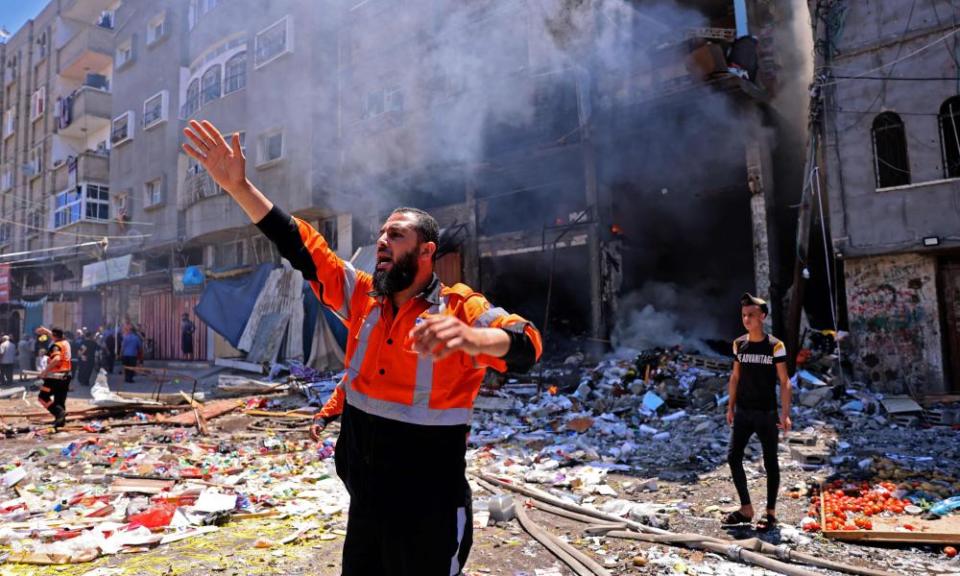The Observer view on the Israel-Palestine conflict

The sudden rekindling of the Israel-Palestine conflict, and the ensuing horrors, is a shameful reminder of the international community’s almost criminal neglect of the crisis. There have been no substantive peace talks for more than a decade. Donald Trump’s “deal of the century” was a cruel sham. Efforts now under way to engineer a ceasefire, or what is called a “sustainable calm”, amount to applying a sticking plaster to a deeply felt, long-festering wound.
This story of neglect, cementing in place injustices and inequities stretching back to the 1948 Palestine war, made a new explosion of violence all but inevitable. It has played into the hands of extremists on both sides who seek victories, not peace. It threatens the future of Israel and Palestine and regional stability. The events of the past week have rendered the prospect of a lasting settlement more distant than ever.
In several respects, the latest clashes broke new ground, all of it negative. The sustained rocket barrage mounted by Hamas from its Gaza stronghold, targeting Tel Aviv and penetrating deep into the country, has surprised and alarmed Israel’s leaders. So, too, has intercommunal violence pitting Arab and Jewish Israelis against each other in numerous towns and cities. This fracturing is potentially deeply damaging in the longer term.
But other aspects of the crisis are sickeningly familiar. As in previous wars between Israel and Hamas, in 2009, 2012, and 2014, the principal casualties are civilians, including many children. Given Israel’s vastly superior resources, the toll of death and destruction is disproportionately felt by Palestinians. As in the past, the violence is exacerbating political divisions and polarisation. It feeds the extremists’ narratives of hate.
This state of affairs is inhuman, intolerable, irrational and wholly unacceptable. This cycle of mutual terror and suffering must not be allowed to repeat itself at some future date. Jews and Arabs living side by side can and should do better. Yet for this to happen, greater honesty is essential. It is no good pretending, as so many in Israel, the US, Europe and the Arab sphere do, that the “Palestinian problem” will somehow go away by itself. It will not.
So let’s be honest. Benjamin Netanyahu is not fit to be Israel’s prime minister. His de facto rejection of the UN-backed two-state solution, his support for seizures or annexation of Palestinian land in the West Bank and East Jerusalem, his discriminatory attitude to Israeli Arabs, his tolerance of neo-fascist religious and far-right settler groups and the recent police outrage at Jerusalem’s al-Aqsa mosque have all stoked the current crisis.
Let’s be honest. Mahmoud Abbas, a discredited figure who presides over the Palestinian Authority, is not a fit leader for Palestine, especially without new elections. But neither is Hamas, an oppressive, aggressive organisation that depends on Qatar and Iran, rejects Israel’s right to exist and evidently has no qualms about using its own people as human shields to advance its claim to Palestine’s leadership.
Let’s be honest. In the end, issues of religion, ethnicity, race and even land are not the main problem. The problem is that, politically speaking, both Israelis and Palestinians are shockingly badly led. Each day, shared hopes of peace, security and prosperity are betrayed by blinkered politicians and ideologues who prioritise their own interests and prejudices. Each day, by their actions and inactions, the US and Britain perpetuate a historical confrontation they played a big part in creating.
Both sides need fresh leaders, infused with a vision for peace, not war. A truce is a necessary first step and is required immediately. But a cessation must not be a signal, as in the past, for the world’s attention to turn away. It must be the moment when a new, determined international diplomatic drive begins for a permanent two-state settlement that both peoples, under new management, can live with. It’s the only honest way.

 Yahoo Finance
Yahoo Finance 